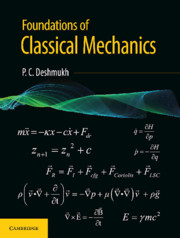Book contents
- Frontmatter
- Dedication
- Contents
- List of Figures
- List of Tables
- Foreword
- Preface
- Introduction
- 1 Laws of Mechanics and Symmetry Principles
- 2 Mathematical Preliminaries
- 3 Real Effects of Pseudo-forces: Description of Motion in Accelerated Frame of Reference
- 4 Small Oscillations and Wave Motion
- 5 Damped and Driven Oscillations; Resonances
- 6 The Variational Principle
- 7 Angular Momentum and Rigid Body Dynamics
- 8 The Gravitational Interaction in Newtonian Mechanics
- 9 Complex Behavior of Simple System
- 10 Gradient Operator, Methods of Fluid Mechanics, and Electrodynamics
- 11 Rudiments of Fluid Mechanics
- 12 Basic Principles of Electrodynamics
- 13 Introduction to the Special Theory of Relativity
- 14 A Glimpse of the General Theory of Relativity
- Index
9 - Complex Behavior of Simple System
Published online by Cambridge University Press: 06 November 2019
- Frontmatter
- Dedication
- Contents
- List of Figures
- List of Tables
- Foreword
- Preface
- Introduction
- 1 Laws of Mechanics and Symmetry Principles
- 2 Mathematical Preliminaries
- 3 Real Effects of Pseudo-forces: Description of Motion in Accelerated Frame of Reference
- 4 Small Oscillations and Wave Motion
- 5 Damped and Driven Oscillations; Resonances
- 6 The Variational Principle
- 7 Angular Momentum and Rigid Body Dynamics
- 8 The Gravitational Interaction in Newtonian Mechanics
- 9 Complex Behavior of Simple System
- 10 Gradient Operator, Methods of Fluid Mechanics, and Electrodynamics
- 11 Rudiments of Fluid Mechanics
- 12 Basic Principles of Electrodynamics
- 13 Introduction to the Special Theory of Relativity
- 14 A Glimpse of the General Theory of Relativity
- Index
Summary
I am convinced that chaos research will bring about a revolution in natural sciences similar to that produced by quantum mechanics.
—Gerd BinnigLEARNING FROM NUMBERS
The equations of motion of classical mechanics, whether Newton's, Lagrange's, or Hamilton's, have us believe that given the state of the system at a particular time, one can always predict what its state would be any time later, or, for that matter, what it was any time earlier. This is because of the fact that the equations of motion are symmetric with respect to time-reversal: (t)→(–t). Classical mechanics relies on the assumption that position q and momentum p of a mechanical system are simultaneously knowable. Together, the pair (q, p) provides a signature of the state of the system. Their time-dependence, i.e., provided by the equations of motion, accurately describes their temporal evolution. For macroscopic objects, this is an excellent approximation, and the classical laws of mechanics are stringently deterministic. This is stringently correct, but there is an important caveat, expressed succinctly by Stephen Hawking: “Our ability to predict the future is severely limited by the complexity of the equations, and the fact that they often have a property called chaos… a tiny disturbance in one place, can cause a major change in another.” The difficulty Hawking alludes to has nothing to do with the quantum principle of uncertainty, but to a challenge within the framework of the fully deterministic classical theory. The solution to the temporal evolution may become chaotic, even as they remain deterministic, due to extreme sensitivity to the initial conditions that are necessary to obtain the solution to the equation of motion. Careful admission of the previous remark would prepare you to embark your journey on the exciting field of chaos. Along the way, you will also meet objects having weird fractional dimensions. The field covered by chaos theory is vast, though relatively young. It is a very rich field and can be introduced from a variety of perspectives.
The general field of chaos theory is often regarded as a study of a ‘dynamical system’ which is just about any quantity which changes, and one has reasons to track these changes and the sequence of values it may take, for example, over a time interval.
- Type
- Chapter
- Information
- Foundations of Classical Mechanics , pp. 306 - 346Publisher: Cambridge University PressPrint publication year: 2019



